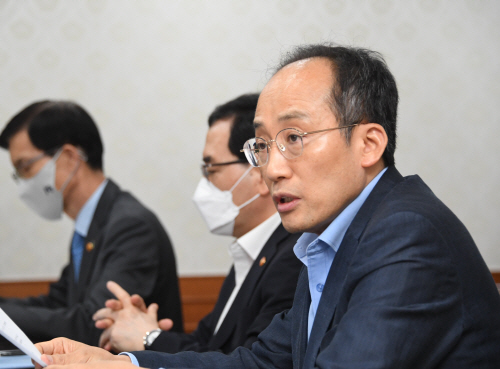 |
| Deputy Prime Minister and Minister of Economy and Finance Choo Kyung-ho speaks during an emergency meeting of economy-related ministers at the Government Complex Seoul on June 19, 2022./ Source: The Ministry of Economy and Finance |
AsiaToday reporter Son Cha-min
The government has announced Sunday a package of emergency measures, including expanding fuel tax cuts to 37 percent and raising income tax deduction rates for public transit use to 80 percent, as part of efforts to ease inflation pressure amid surging energy prices.
“We will expand tax cuts on fuel consumption to a legal cap of 37 percent starting from July through the end of this year, in order to induce a reduction in the selling price of petroleum products,” said Deputy Prime Minister and Minister of Economy and Finance Choo Kyung-ho at the first-ever emergency meeting of economy-related ministers under the new government held at the Government Complex Seoul.
Under the new decision, the fuel tax for gasoline, diesel and LPG butane will drop by an additional 57 won, 38 won, and 12 won per liter, respectively.
The move comes as the fuel prices have been on an upward trend even after the fuel tax cut was raised to 30 percent, up from the previous 20 percent, last month.
According to the Korea National Oil Corporation’s Opinet website as of Sunday, the average gasoline and diesel prices in Seoul reached to hit 2,167 won and 2,174 won per liter, respectively.
To provide more subsidies for cargo truck drivers and others using diesel-powered vehicles, the government will reduce the threshold price set for subsidy payments to 1,700 won per liter from 1,750 won per liter.
For air transportation, the government will remove the current import tariff of 3 percent on jet fuel for domestic airlines temporarily from August to December.
To encourage the use of public transportation and alleviate the people’s burden, the government decided to double the tax deduction rate to 80 percent for credit card use for pubic transportation, in the second half of this year.
The government also hinted at the possibility of utility bill hike, but emphasized that the increase would be minimized to further minimize the hit to consumers.
In addition, it plans to monitor market conditions and respond properly for agricultural and livestock products that are likely to see price surge further.
“We will continue to take prompt measures that can help stabilize prices and lift the cost burden on the public,” Choo said.
#fuel tax cut #income tax reduction #energy price #gasoline #diesel
Copyright by Asiatoday
Most Read
-
1
-
2
-
3
-
4
-
5
-
6
-
7





















